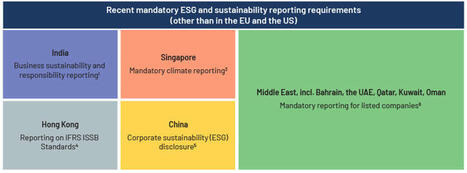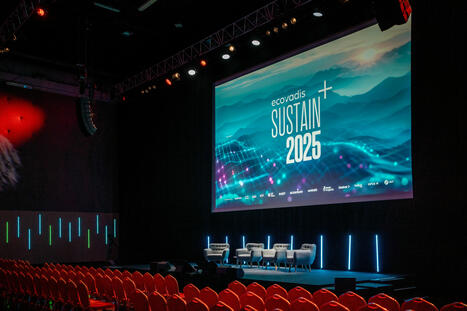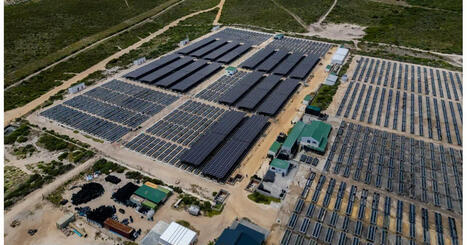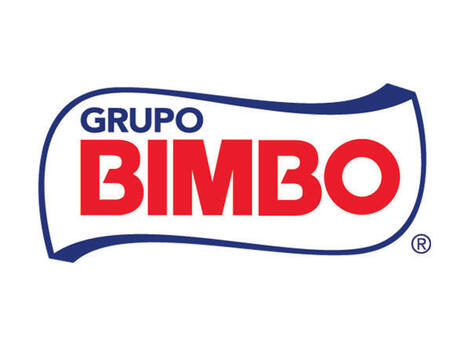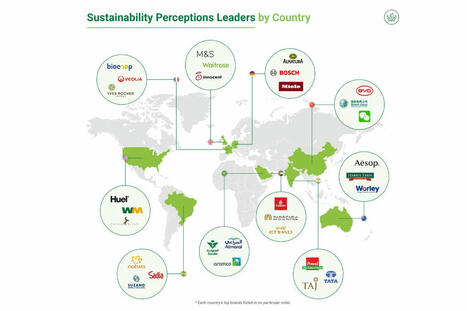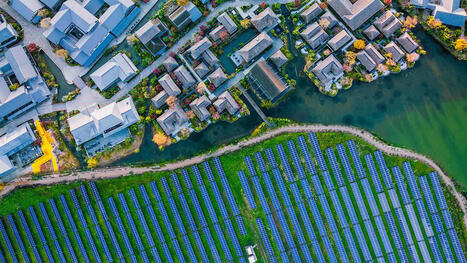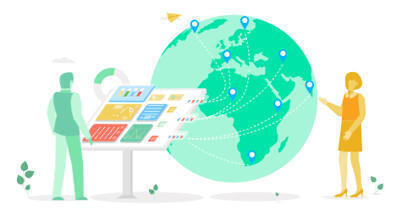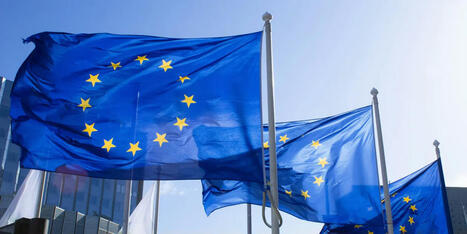 Your new post is loading...

|
Scooped by
EcoVadis
October 23, 2025 3:04 AM
|
Sustainability is integral to private equity strategy, driving value creation, strengthening risk management, and meeting the demands of heightened stakeholder scrutiny. As regulatory mandates proliferate and limited partners (LPs) set a higher bar, PE firms are rethinking how sustainability is embedded across the investment lifecycle. This evolution goes beyond compliance or disclosure; it reflects a broader recognition that environmental, social and governance considerations influence performance, resilience and long-term competitiveness. In today’s complex and often polarized landscape, the challenge is to advance sustainability in ways that are credible, focused and economically grounded.

|
Scooped by
EcoVadis
October 23, 2025 3:00 AM
|
- Integrating ESG due diligence in PE investment transactions manages risks and drives long-term value.
- Structuring deals and negotiating appropriate protections in transaction documents fosters better ESG practices by identifying both risks and opportunities.
- ESG and sustainability, initially viewed from a risk management perspective, are now considered significant drivers of value.

|
Scooped by
EcoVadis
October 23, 2025 2:52 AM
|
This investor briefing summarises a landscape analysis of 169 investor disclosure frameworks analysed with the support of Canbury Insights. It aims to contribute to responsible investors’ understanding of existing investor sustainability disclosure regulations and policy guidance established by governments and non-government bodies. It also aims to inform optimal pathways towards streamlining and enhancing the interoperability of investor requirements.

|
Scooped by
EcoVadis
June 17, 2025 3:15 AM
|
Environmental, social and governance (ESG) factors have increasingly become integral to investment decisions in private markets ESG trends. Our Private-Markets Survey 2024 suggests that more than 90% of private-markets investors consider ESG-related risks in their investment decisions. In fact, 46% of the respondents reported having a comprehensive process in place to identify and mitigate ESG risks.

|
Scooped by
EcoVadis
June 17, 2025 3:10 AM
|
Private market investors are crucial in transitioning to a low carbon economy by combining longer-term patient capital with commercial and operational expertise.
Removing funding constraints, optimizing and repositioning business models and rapid and efficient company scaling allow general partner portfolio companies to unlock growth for a faster energy transition.
Successful private equity firms integrate sustainability into portfolio companies’ core value propositions, ensuring they are well-positioned for future exits and liquidity events.

|
Scooped by
EcoVadis
June 17, 2025 2:58 AM
|
Early signs indicate that tariff turmoil has held back deals and exits while investors digest the implications, both short and long term.
The second-quarter slowdown has exacerbated the urgent need to improve liquidity by accelerating full exits, refreshing value-creation plans where necessary.
Amid lingering volatility, PE firms can regain momentum through proactive dealmaking, clear-eyed due diligence, and a renewed focus on revenue and profit growth.

|
Scooped by
EcoVadis
June 17, 2025 2:46 AM
|
Sustain 2025 spotlighted supply chain sustainability, ESG compliance readiness and scope 3 action as keys to business resilience in uncertain times.
We’re in what thought leader John Elkington describes as a “sustainability recession”. Global instability and economic volatility are causing some governments and companies to scale back their ESG commitments and push sustainability priorities to the margins.
But our annual Sustain conference, held this March in Paris, was a powerful counterpoint. With 700 business leaders and sustainability practitioners attending in person – and another 2,400 joining virtually from over 100 countries – the event underscored a critical truth: pulling back on sustainability now will only leave us more vulnerable in the long term. Across inspiring panel discussions and breakout sessions, we heard that the path forward demands stronger collaboration, smarter supply chains and bold leadership that transforms both the how and why of business.

|
Scooped by
EcoVadis
June 17, 2025 2:29 AM
|
Finance claims to be the sector with the greatest positive impacts on people and the planet, according to the first batch of mandatory EU sustainability reports.
Analysis of statements made under the new Corporate Sustainability Reporting Directive (CSRD) this year shows asset managers, banks and insurers are among the most optimistic about their contribution to environmental and social objectives.

|
Scooped by
EcoVadis
June 17, 2025 2:27 AM
|
IN recognition of World Ocean Day, observed annually on 8 June, the Sea Harvest Group reaffirms its commitment to sustainable fishing practices and to preserving the health of the world’s oceans. As an organisation whose operations are intrinsically linked to the ocean, Sea Harvest is dedicated to ensuring that marine resources continue to benefit both South Africa and future generations.

|
Scooped by
EcoVadis
June 17, 2025 2:21 AM
|
As part of its Nourishing a Better World sustainability strategy, Grupo Bimbo has established a comprehensive plan to protect and preserve natural systems through its For Naturepriority. This plan is structured around three key pillars: Net Zero Carbon Emissions, Zero Waste, and Regenerative Agriculture.

|
Scooped by
EcoVadis
June 17, 2025 1:03 AM
|
Nescafé, a Nestlé coffee brand, has already beaten its coffee sustainability goal for 2025 by sourcing 32% of its coffee through regenerative agriculture in 2024. This move shows strong progress toward its 2030 target of 50% and Nestlé’s net-zero goals.
Backed by more than $1 billion in funding, Nestlé supports this transition with major investments in farmer training and eco-friendly farming practices. The change adds value by lowering the coffee’s environmental impact. It reduces greenhouse gas (GHG) emissions and boosts long-term supply chain stability.

|
Scooped by
EcoVadis
June 17, 2025 1:02 AM
|
The Sustainability Perceptions Index 2025 report by Brand Finance quantified the financial value of sustainability perceptions and highlighted the gaps between brand reputation and actual Environmental, Social, and Governance (ESG) performance.
Brand Finance’s research data showed Woolworths is widely recognised in its home market as a brand deeply committed to environmental and social responsibility, as well as strong governance.
Tangible ESG actions and transparent reporting of progress underpin these perceptions.

|
Scooped by
EcoVadis
June 16, 2025 5:55 AM
|
This blog provides an analysis of the phase-out of Germany’s Supply Chain Act (LkSG) and how it ties in with EU’s directives, such as CSRD and CSDDD, and showcases the strategic significance of resilience amid regulatory uncertainty.
|

|
Scooped by
EcoVadis
October 23, 2025 3:02 AM
|
General partners (GPs) can use the guide to inform their supply chain due diligence and ongoing management processes, while limited partners (LPs) can use it to better understand their GPs’ approaches to sustainable supply chains. It also provides guidance applicable to private markets investors’ portfolio companies.

|
Scooped by
EcoVadis
October 23, 2025 2:59 AM
|
- The number of PE-owned companies disclosing their climate impact has jumped 55%, according to research from Bain and CDP.
- Scope 1 and 2 emissions are down—a median 26% for Scope 2—and many companies are seeing clear business benefits.
- Decarbonization leaders have engaged in five common practices to generate business results.

|
Scooped by
EcoVadis
June 19, 2025 4:07 AM
|
The business case for sustainability is clear, and momentum is building. This report reflects how EcoVadis helps companies accelerate this transformation, living our purpose: to guide all companies toward a sustainable world. It covers progress on our four purpose objectives and highlights some concrete achievements we are proud of.

|
Scooped by
EcoVadis
June 17, 2025 3:13 AM
|
The private equity (PE) landscape is rapidly transforming, driven by increasing investor and regulatory focus on Environmental, Social, and Governance (ESG) factors. As we look ahead to 2025, four key trends are set to redefine how PE firms approach ESG integration and value creation.
1. Heightened Regulatory Pressure: CSRD and Beyond
2. Increased Focus on ESG as a Driver of Value Creation
3. Decarbonisation: Turning Targets to Action
4. The Nature Imperative

|
Scooped by
EcoVadis
June 17, 2025 3:07 AM
|
Malk Partners’ 2025 State of ESG Report captures how ESG practices are evolving across private equity, private credit, venture capital, real estate, and infrastructure. Based on survey responses from 71 GPs representing $2.6T in AUM and 105 sponsor-backed portfolio companies, this third annual report provides a nuanced, data-driven view into how investors and companies are navigating a rapidly shifting ESG landscape.

|
Scooped by
EcoVadis
June 17, 2025 2:46 AM
|
As a conclusion to our annual Sustain conference – or rather, a launchpad for addressing the challenges of 2025 – EcoVadis updates its Index Online, now with data derived from assessments conducted throughout 2024 on companies with 25 or more employees.
Measuring Sustainability Progress of Companies Worldwide
EcoVadis evaluates the sustainability management systems of thousands of companies of all sizes and maturity across three fundamental pillars: policies, actions and results. A company’s line of activity, size and location shape the assessment, drawing from 21 criteria grouped into four assessment themes: Environment, Labor & Human Rights, Ethics and Sustainable Procurement. Results are consolidated into a 0-100 score for the overall and theme performance and feed the publicly accessible Index Online, updated every year.

|
Scooped by
EcoVadis
June 17, 2025 2:45 AM
|
Driving positive impact and realizing sustainability-enhanced growth opportunities across supply chains has never been more complex – or more promising. With escalating geopolitical risks, tariffs, cost volatility and ESG regulations, even mature sustainable procurement programs must upgrade their strategies and tools to comply and create mutual value.
Drawing on research from our Sustainable Procurement Barometer and Carbon Action Report, this ebook outlines five key accelerators helping leaders transform their sustainable programs.

|
Scooped by
EcoVadis
June 17, 2025 2:29 AM
|
Ellie Gabel discusses how, as zero-waste beauty gains momentum, the cosmetics industry is rethinking packaging with sustainable materials, refillable systems, and innovative designs that reduce environmental impact.

|
Scooped by
EcoVadis
June 17, 2025 2:27 AM
|
Reworld™, a leading sustainable waste solutions company, released its 2025 Sustainability Report, showcasing how it is helping customers and communities waste better through innovative technologies and a commitment to circularity. The report highlights how Reworld™ is delivering on its mission to advance sustainability, scale innovation and support the communities in which it operates.

|
Scooped by
EcoVadis
June 17, 2025 2:20 AM
|
Valmont® Industries, Inc. (NYSE: VMI), a global leader that provides products and solutions to support vital infrastructure and advance agricultural productivity, today released its 2025 Sustainability Report. The report highlights Valmont’s ongoing commitment to operational efficiency, innovation, and environmental responsibility. It also outlines key initiatives that support resilient infrastructure, water conservation in agriculture, and employee well-being.
"At Valmont, sustainability is inherent to the way we operate," said Avner Applbaum, President and CEO. “Every day, our 11,000 employees bring energy to our purpose of Conserving Resources. Improving Life®. This report showcases their dedication and the real-world outcomes we are achieving around the globe."

|
Scooped by
EcoVadis
June 17, 2025 1:03 AM
|
The European Parliament’s lead negotiator on the Omnibus regulatory package, Jörgen Warborn of the European People’s Party (EPP), has released a proposal calling for significantly deeper cuts to the EU’s sustainability reporting obligations than those originally suggested by the European Commission.
The draft amendments—intended to form the Parliament’s negotiation stance—would drastically narrow the scope of both the Corporate Sustainability Reporting Directive (CSRD) and Corporate Sustainability Due Diligence Directive (CSDDD). Warborn’s version raises the threshold to 3,000 employees and €450 million in annual revenue, compared to the Commission’s proposal of 1,000 employees. This would remove the vast majority of companies from mandatory sustainability reporting.

|
Scooped by
EcoVadis
June 17, 2025 1:00 AM
|
Arecent analysis from the International Federation of Accountants (IFAC) plus AICPA and CIMA reveals that approximately three in four of the largest international firms sought verification of their sustainability disclosures in 2023.
In 2023, 73% of large firms from G20 countries secured assurance on their sustainability disclosures, a growth from 69% recorded in the prior year.
The research, now in its fifth iteration, features updated figures for 2023 and underscores a growing trend in sustainability verification.
|
 Your new post is loading...
Your new post is loading...









